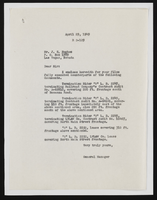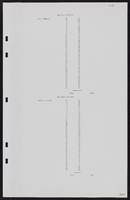Search the Special Collections and Archives Portal
Search Results

Transcript of interview with Sharon and Henry Hwang by Stefani Evans and Claytee D. White, February 21, 2017
Date
2017-02-21
Archival Collection
Description
"There's nothing really authentic here. I'm kind of tired of the buffet already." In the early 1990s, Henry Hwang, recent emigrant from Taiwan, listened as his Los Angeles neighbors returned from gambling trips to Las Vegas and complained that they could find no good Chinese restaurants in the Entertainment Capital of the World. They continued to visit Las Vegas, but after two or three days they grew tired of buffet dining and searched in vain for a place to enjoy a good Chinese meal. Having been a businessman in Taiwan, Hwang recognized an opportunity. He envisioned creating a space in Las Vegas that would serve tourists and the local Asian population alike. It would have not only good Chinese restaurants, but it would also have top-brand Asian supermarkets. With his wife and two partners, Hwang set about to realize his vision. In this interview, Henry and his daughter, Sharon Hwang, talk about their lives in Taiwan and beginning anew in Las Vegas. They talk about Henry’s search for the right parcel in a good location and about working with the architect to create a center true to Tang dynasty architecture and symbolism. They also share the story of the Journey to the West as the cultural strength of the center and have held annual Chinese New Year celebrations to teach Chinese culture for 23 years. The elements of location, architecture, and culture combined to grow Chinatown Mall beyond Henry’s original idea and inspired other Asian businesses to locate nearby. West Spring Mountain Road became a bustling pan-Asian district that caters to many local and tourist communities as well as to Las Vegas’s hospitality industry. In 1996 Clark County officially designated the area as Chinatown District, and in 1999, Nevada Governor Kenny Guinn officially named as Chinatown the three-mile stretch of Spring Mountain Road from Las Vegas Boulevard to Rainbow Boulevard. Henry also shares his reasons for leaving Taiwan and pursuing life in Las Vegas. He, his wife, and one of the original partners still own Chinatown Mall, but Henry has ceded its operation to Sharon, who oversees and nurtures the Mall’s cultural and financial pillars equally. Sharon talks about the difficulty of entering Durango High School as a new immigrant and her wonderment at the give-and-take of classroom discussions. A member of Durango’s first graduating class, she recalls her time at the University of Nevada, Las Vegas (UNLV), where she earned her B.A. degree in business administration in 1999. Sharon is proud of her father and mentor—his innovative thinking, business vision, and strong work ethic—and she is delighted to call Las Vegas home.
Text

Transcript of interview with Charles Nur Fernald by Claytee D. White, May 31, 2014
Date
2014-05-31
Archival Collection
Description
Dancer Charles Nur Fernald first came to Las Vegas in 1963 to perform for five weeks in the Kay Starr Show at the Sahara Hotel and again in 1964 working with Donn Arden for three months at the Desert Inn Hotel. Born in Detroit, Michigan, in 1939, Charles moved several times to various places in Arizona and southern California with his parents, Charles Knox Fernald and Marguerite Marie Higgins Fernald, and half-siblings before settling in Hollywood, California, where he remained (except for his short stints in Las Vegas) from 1961 to 1967. In January 1968 Charles came to Las Vegas to perform with Sid Caesar and Imogene Coca at the Flamingo Hotel. After the show closed Charles auditioned for Donn Arden to dance in the Lido de Paris show at the Stardust Hotel, where he remained for sixteen years, 1968 through 1984. He remains the only male dancer who performed with Lido through five different, consecutive productions. In 1969 Charles met his partner, Aquiles Garcia, who was a dancer at the Dunes Hotel. The couple remain in Las Vegas and have been together forty-five years. Charles’s father was very poor and left school after the third grade to go to work and help support his family. He was born in 1889 in Philadelphia, Pennsylvania, the fifth of eleven children. As an eight-year-old he became a “groundhog,” a digger of New York’s underwater tunnels, who helped build the Holland Tunnel. At fifteen he made more money than his father selling newspapers, fresh fruit, and clothing door to door or from the street corner. According to Charles, his father “drank too much, ate too much, smoked too much, and loved too much.” As an only child, Charles’s mother had a very different upbringing from his father, although her family too was very poor. She was born in Detroit in 1902 to a railroad switchman father and mother who not only scrubbed the floors of wealthy Detroiters but also cooked meals for twenty-one boarders at a rooming house. Marguerite’s parents worked hard so they could send their only child to Catholic school and the Detroit Conservatory of Music.
Text
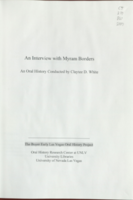
Transcript of interview with Myram Borders by Claytee D. White, February 9, 2009
Date
2009-02-09
Archival Collection
Description
Growing up in Las Vegas, Myram Borders remained in Nevada most of her life. After graduating from high school, she attended the University of Nevada Reno. An internship with United Press International wire service would place her on a career path that included working in Reno, Los Angeles, and then brought her back to Las Vegas in 1965. Her journalism experience with UPI created a foundation for unique insights about living in Las Vegas and the effect gaming had on the world's perceptions of Las Vegas newsworthiness. After her long career with UPI, Myram also worked briefly for Gannett and then became commissioner of Consumer Affairs under Gov. Bob Miller, which she admits was not her favorite work. Her next step was to head up of the Las Vegas News Bureau. As one might expect, Myram has stories about the stories she covered. She recalls how by sheer accident she came upon the scene of Lefty Rosenthal's car being blown up in a parking lot. She explains how a light system was put atop the El Cortez Hotel to signal whether workers were to show up for work at the test site. She covered the first woman dealer in Las Vegas and scooped other reporters to announce Elvis' wedding at the Aladdin.
Text
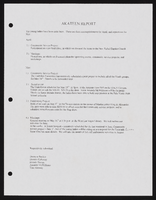
Alpha Kappa Alpha Sorority, Theta Theta Omega Chapter AKAteens reports
Date
2002-01-16
Archival Collection
Description
From the Alpha Kappa Alpha Sorority, Incorporated, Theta Theta Omega Chapter Records (MS-01014) -- Chapter records file.
Text
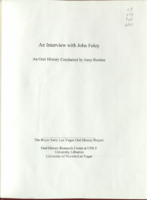
Transcript of interview with John Foley by Irene Rostine, May 11, 2011
Date
2011-05-11
Archival Collection
Description
John Foley is the youngest of five sons bora to Roger T. and Helen Foley. John's grandfather, Thomas L. Foley was an early transplant to Nevada when he headed for Goldfield in 1907. By 1910 Grandfather Foley had persuaded his son Roger T. to move west - it was a boom time. Roger who was finishing law school in Chicago passed both the Nevada and California bar exams in 1911. Two years later he married Helen who he knew from Chicago and with that launch a legal dynasty in southern Nevada: Roger, Thomas, George, Joseph and John. Each son would enjoy participating successfully in the history of Las Vegas. In this series of interviews, John shares his personal accomplishments as well as mentions his brothers contributions and service to the community. He talks about being young men, his brothers going off to war, the part-time jobs made available by the ever changing landscape of the area, new jobs and growth. He attended Fifth Street Elementary School and Las Vegas High School, actively encouraged the creation of the Boyd Law School at UNLV, and was elected a Nevada State Senator among many other activities as well as being father to his six children. John witnessed Las Vegas outgrowing its "little sister to Reno" role and now enjoys bragging that a fourth generation of Foleys lives in Las Vegas, many of whom carry on the family tradition of being lawyers.
Text
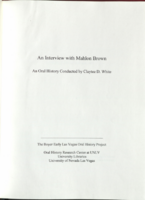
Transcript of interview with Mahlon Brown by Claytee D. White, December 16, 2003
Date
2003-12-16
Archival Collection
Description
Attorney Mahlon Brown begins by talking about his family. His dad was a senator for Nevada, his grandmother was an "amazing, strong, powerful, and insightful" woman, and his mother he describes as beautiful, well-read, and a music lover. He reminisces about his undergraduate days at Howard University and the job he held as a Capitol policeman during the sixties. This included guarding JFK's casket. Mahlon recalls many notable Nevadans that he knew personally, worked closely with, or came up against in meetings or trials. He shares many anecdotes and stories about his contact with Judge Foley, Ronald Pollock, Kenny Guinn, Father Vitali, and Earl White, to mention just a few. He also shares memories of women like Ruby Duncan, Mary Wesley and Maya Miller. Attorney Brown describes the duties of the office of Justice of the Peace which he held for a few years, as well as some of the cases he and Jack Anderson handled when they worked in Legal Services. He also describes the poverty workshop he and Jack ran for three or four years, which gave welfare recipients a chance to air their opinions. Mahlon shares his opinions, insights, and firsthand knowledge of the Mob, Howard Hughes, Mayor Oscar Goodman, Malcolm X, James Brown, integration on the Strip, and many other topics. His personal connections and lengthy history of working and living in Las Vegas make for knowledgeable and entertaining reading.
Text
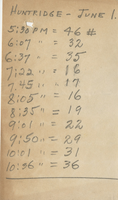
Chart of pressure readings from a well at Huntridge subdivision, June 1950
Date
1950-06
Archival Collection
Description
Handwritten note: three days of pressure readings from a well in the Huntridge subdivision
Text
Pagination
Refine my results
Content Type
Creator or Contributor
Subject
Archival Collection
Digital Project
Resource Type
Year
Material Type
Place
Language
Records Classification

